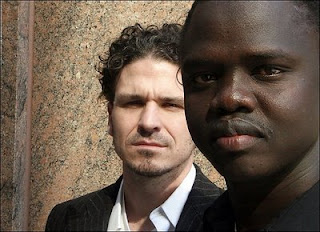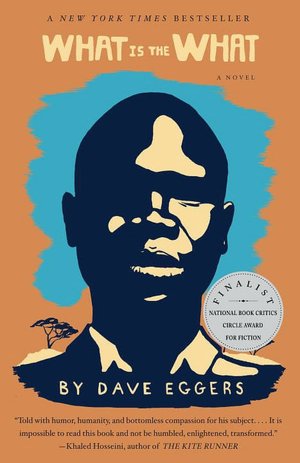Hello Meltingpot Readers,
I am having a great time compiling my list of White People Who Tell Black Stories for Black History Month. Thanks to all of your thoughtful comments, I'm really thinking about things differently, asking myself questions I hadn't before. Most importantly, I'm wondering, does it really matter who is telling these stories? Isn't it more important that the stories are being told? Today's author is a great example.
Meet Dave Eggers. Famously known for his 2000 memoir, A Heartbreaking Work of Staggering Genius, the literary magazine, McSweeneys and other things literary and liberal, his career took a different turn in 2006 when he wrote, What is the What.
What is the What is a fictionalized autobiography of Valentino Achak Deng, one of the Lost Boys of Sudan. Eggers spent years interviewing Deng, originally intending to help him write his own life story, but the two soon agreed that Eggers would write the book. Eggers decided to call the book fiction to give himself the freedom to fill in the gaps that Deng could not remember of his harrowing journey from Sudan to the United States. The book received excellent reviews and was overwhelmingly praised.
"What Is the What” is an extraordinary work of witness, and of art." The New York Times
"Hands down, Dave Eggers’ What Is the What stands as the single most thought-provoking, unusual and moving book I have read all year." USA TODAY
" With its perfect blend of epic sweep and small, intimate moments, it stands worthily alongside the best work of Chinua Achebe, Amos Tutuola and Ben Okri." Seattle Times
THE SUCESS: A New York Times Bestseller, What is the What also won the Prix Médicis in France. It has been selected as the summer reading book for incoming Freshman at universities across the country including this year's incoming class at Duke University. But here's the catch. All of the proceeds for the book went to support the Valentino Achak Deng Foundation.
GIVING BACK: Let's review. So Dave Eggers, a White man, who garnered much literary praise and success for his book about a Black man's life, made sure to compensate that Black man for sharing his life story. I don't know how "proceeds" were defined between Eggers, Deng and the publisher, but I also don't really care, because the proof is the continued success of the VAD foundation. Check out their website to see how much has been done and continues to be done. If Eggers hadn't lent his considerable talents and established name to getting Deng's story out there, would the Marial Bai Secondary School even exist? Would Americans be as aware of the struggles of the people in Sudan? Would they have a real face to put on a Lost Boy's story?
Is there a difference between collaboration and appropriation and just plain stealing? Who knows the rules?
I'm listening.
Peace!


3 comments:
I am happy that my comments were thought provoking!
I simply must read this book!
Hi,
You have once again brought an excellent book to the table. I am unable to read all of these books so quickly, but I am taking notes.
Returning to your orginal question, I think one element which needs to be mentioned is the publisher/agent. As I am not a writer I don't know all of the dynamics, but from what I hear it comes downs to whether or not they think your book will sell. Let's face it, in the US there is the notion that black people don't read. This goes at least as far back as the Zora Neal Hurston days. So if the publish/agent thinks that if a white person telling the story about black people will sell more books, then you know who gets the deal. It does not mean it was the better book.
Regarding Eggers' book, it is great to see that it brought awareness and funding to the VAD Foundation. May be you have read the book "Three Cups of Tea" by Greg Mortenson which is about building schools in remote areas of Pakistan. This was also for a humanitarian cause, but initially Mortenson struggled to get financing for the project. I would say chapeau to Deng if he saw this book as a way to get funding while he concentrated on the idea.
I think there is definitely a difference, Eggers is an example of how it should be done.
But when you watch those movies like Dangerous Minds and Freedom Writers and The Ron Clark Story, I get annoyed. They paint these white teacher as heroes who saved minorities from themselves....
I think as long as there is proper compensation and close interaction between the subject and the storyteller, its okay. But sadly most of the time, its none of this.
Post a Comment